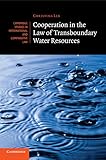Cooperation in the law of transboundary water resources / Christina Leb.
Material type: TextSeries: Cambridge studies in international and comparative lawPublisher: Cambridge, United Kingdom : Cambridge University Press, 2013Description: xxvii, 330 pages ; 24 cmContent type:
TextSeries: Cambridge studies in international and comparative lawPublisher: Cambridge, United Kingdom : Cambridge University Press, 2013Description: xxvii, 330 pages ; 24 cmContent type: - text
- unmediated
- volume
- 9781316500590 (pbk.)
- 110703597X (hbk.)
- 341.44 23
- K3498 .L43 2013
- LAW034000
| Item type | Current library | Collection | Call number | Status | Barcode | |
|---|---|---|---|---|---|---|
 Books
Books
|
PIPS Library | NFIC | 341.44 LEB 951 (Browse shelf(Opens below)) | Available | 951 |
Browsing PIPS Library shelves Close shelf browser (Hides shelf browser)

|

|

|

|

|

|

|
||
| 341.23 ZIF-U 177 United Nations Reform : heading north or south? / | 341.232 POP-G 1003 The Security Council as global legislator / | 341.44 IJA-I 740 Indus Waters Treaty: Political and legal dimensions | 341.44 LEB 951 Cooperation in the law of transboundary water resources / | 341.4420954 IJA-I 1175 Indus waters treaty: Political and legal dimensions | 341.4420954 IJA-I 825 Indus Waters Treaty Political and Legal Dimensions | 341.48 KOL-R 332 Research handbook on human rights and humanitarian law / |
Includes bibliographical references (pages 299-320) and index.
Introduction -- Cooperation between sovereign states -- Development of international water law -- The duty to cooperate and concurrence of principles -- Informing cooperation -- Adoption of joint measures -- International protection of vital human water needs -- Emerging international cooperation on global water challenges -- Conclusion -- Annex. Consideration of cooperation in international treaties.
"Climate change, population growth and the increasing demand for water are all capable of leading to disputes over transboundary water systems. Dealing with these challenges will require the enhancing of adaptive capacity, the improving of the quality of water-resources management and a reduction in the risk of conflict between riparian states. Such changes can only be brought about through significant international cooperation. Christina Leb's analysis of the duty to cooperate and the related rights and obligations highlights the interlinkages between this duty and the principles of equitable and reasonable utilisation and the prevention of transboundary harm. In doing so, she considers the law applicable to both international watercourses and transboundary aquifers, and explores the complementarities and interaction between the rules of international water law and the related obligations of climate change and human rights law"-- Provided by publisher.
There are no comments on this title.
